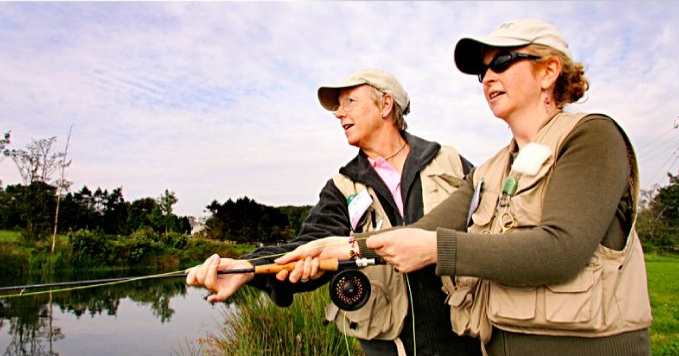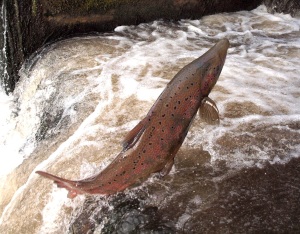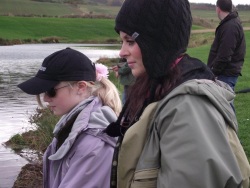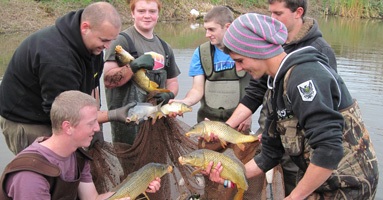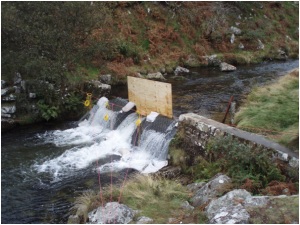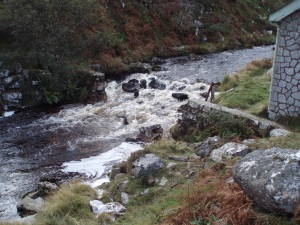REPORT OF ANGLING PARTICIPATION EVENTS AND COLLABORATIVE PROJECTS 2011 – By Sally Gallop
Agency run days
Family Trout Fishing day 7th August at Siblyback Lakes
The weather was unsure but we were lucky not to get too wet. Good numbers of people arrived despite traffic and weather and two very lucky Liverpool supporters caught fish on the day. Great atmosphere and a great day.
Family Coarse fishing day 13th August Bake Lakes, Trerulefoot.
Again this event did not disappoint so much interest that we split the day into two sessions, everyone caught fish and the parents and guardians all got involved
This event brings down Danny Williamson and Paul Power for extra help along with my normal coaches Bob Tetley and Jerry Clarke and as usual it was a delight to work with them. These days are full of laughter and fun, but also an awful lot of information is passed on to the participants who learn a lot about fishing.
Family Coarse fishing day 17th August Higher Shorston Lakes
The first time we have used this venue and what a lovely place, everyone caught a good size fish and countless small ones. Definitely would like to use this place again in the future.
Coarse fishing junior days.
3rd June Bake Lakes Trerulefoot
As always the venue fished very well, all participants learnt a lot and many fish were landed. Parents who stayed also learnt about the basics of fishing.
3rd August Threemilestone Angling Club Lake, Threemilestone..
As always a warm welcome awaited us from Ken Hart (Chairman) at Threemilestone, and although the fish were slightly reluctant to show themselves a good day’s tuition was had by all. A large carp caught was the icing on the cake and ended the day in fine fashion.
10th August Whalesborough Bude Canal AA
Cracking venue and a chance for the Agency to use the all access pegs we funded last year. The lake fish extremely well and in future years we will hopefully use the lake to its full potential and have a family day there.
Junior Trout fishing
April 18th Stithians
April 20th Siblyback
April 22nd Treemeadow
Well after choosing the dates carefully at the beginning of the year to increase the chances of catching a trout we had a heat wave ! Still the one thing I can not control is the weather.
The temperature made things tricky for our beginners. But as always the ones that got away were the talk of the day.
PROJECTS
Cornwall Blind Association
Cornwall Blind Association is a local independent charity and company limited by guarantee, providing services, support and advice to visually impaired people in Cornwall. It has served the Cornish community for many years, being established in 1856.
Services are delivered throughout Cornwall with Sight Centres located in Truro and Penwith. Further local services are being developed during 2009 in North Cornwall and Caradon. Cornwall Blind Association aims to provide services to people of all ages and backgrounds...
For the third year we have arranged for Cornwall blind to have three days trout fishing along with the use of the Wheelyboat. This has always been a challenge to our instructor’s one which they have relished and the joy for the participants is immeasurable.
Cornwall Federation of Womans Institutes
The Federation made contact at The Royal Cornwall Show and following this we arranged for one days fly fishing down at Stithians, the interest was immense. So much so that a second project had been set up incorporating sites all over Cornwall, this project will run throughout 2012 and will see the WI have numerous fishing days throughout the county.. Watch this space for a WI fishing club..
Penaire School
14 pupils (including pupils with special needs) attended Stithians Lakes for five days during activities week. With the Agency paying for the instructors the school was able to reduce the cost to the pupils to only the transport fees. This opened up the week to less well off pupils.
From: Gillian Truen
Sent: 27 September 2011 14:43
To: 'Mitchell, Sally'
Subject: RE: Fly fishing
Dear Sally
My comments on the project Most of the boys had not fished before and therefore learned a lot from Gary and Annie Champion. Gary and Annie are dedicated to passing on their wealth of experience to young people of all abilities. The boys responded readily to this and some wanted to take fly fishing up as a hobby. The boys also enjoyed bug dipping in the marshy area, watching the dragon flies and going out on the lake in the boat to fish. Most of them caught at least one to take home and cook.
A.S.K 4ALL
Ask4all is a support group set up by parents of disabled children, they provide support, information and activities.
Our initial two days of fishing were so successful we have funded another five days fishing for members of the group.
Dear Sally
A BIG thank you to you for getting the funding for our days at Bake Lakes. Everyone had a brilliant time and Bob and his helpers were really great, making sure that everyone got the most out of their session. If there is any chance of us having another day sometime we would definitely be interested.
Many thanks
Theresa Burt
Echo Physical Disability Resource Centre
The Echo Centre is a purpose-built, multi-functional resource centre that offers a wide range
of services and activities to people with physical disabilities living in the Caradon area of
Cornwall. The centre's aim is to provide a quality service that promotes independence, social
inclusion, empowerment and rehabilitation and offers carers a break.
ECHO facilitates opportunities and experiences for people with physical disabilities,
encouraging personal fulfilment, self-worth and reintegration into the community.
We have funded the centre for the third year to enable five days coarse fishing at Bake Lakes.
The enjoyment that the people get is un-measurable.


